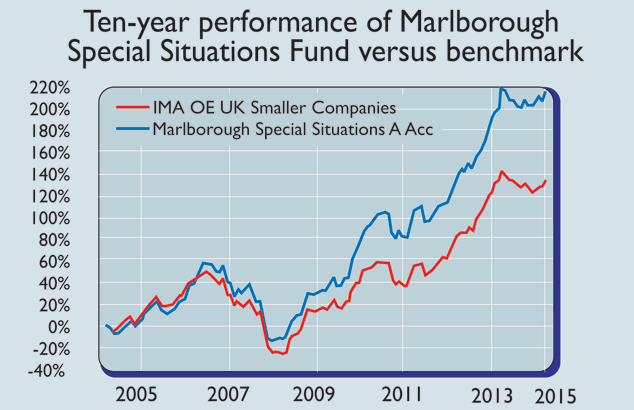
• Read a more in-depth version of this interview here.
Giles Hargreave, 66-year-old co-founder and chairman of Hargreave Hale, is widely seen as one of Britain’s best small companies investors. In fact, last October, adviser Tilney Bestinvest ranked him the UK’s top equity fund manager, based on performance, consistency and experience.
He runs a clutch of funds under the Marlborough banner, including the £830m flagship Marlborough Special Situations fund (see box for more).
More than 40% of the fund is in shares with market capitalisations of £250m to £1bn, while “microcaps” – valued at below £250m – account for 34%. As the “special situations” tag suggests, the fund invests in shares that have hit hard times, but offer good recovery prospects.
According to Hargreaves Lansdown, if you’d invested £1,000 at the FTSE 100’s last peak in 1999, it would be worth over £71,000 now – the best performance of any UK fund in that period.
Aim’s attractive tax breaks
So what’s his secret? At his offices on London’s Baker Street, Hargreave reflects on the evolution of one of his hunting grounds, the Alternative Investment Market (Aim), which celebrates its 20th anniversary in June.
Aim is no different to any other market, he says: “You use the same analysis. Obviously… they tend to be smaller companies and therefore inherently a little bit more speculative.” But many “fulfil the criteria you want to see… good management, profitability, and cash flow. Some of the overseas firms have turned out to be suspect, but there are lots of very good companies too.”
A major draw is the “outstanding” tax break regime, says Hargreave. Now that Aim shares can be held in an individual savings account (Isa), investors need pay no tax on capital gains or dividend income. On top of that, investors don’t have to pay stamp duty on Aim share purchases, immediately saving half a percent.
And for many (though not all) Aim shares, if you hold for two years, you qualify for business property relief – and so up to a 100% exemption from inheritance tax (IHT).
“It’s a highly attractive collection of tax reliefs. Not surprisingly, we’ve seen substantial demand for IHT portfolios.” These are run by Hargreave’s colleague, Richard Hallett. Most have around 20 stocks and aim to take advantage of market volatility or economic uncertainty: “Provided you stick to quality and avoid the speculative mining shares, the oil exploration shares and, to some extent, biotech, you can do extremely well.”
Tips for DIY small-cap investors
What is his advice to private investors thinking of building their own small-cap portfolios? “If they have some experience of reading balance sheets, company profitability records and so on, they can draw their own conclusions. All the information is available on the web.” What about red flags? “Be wary if there’s a change of management; if there are substantial director sales; certainly if profits disappoint; and if the debt increases.”
He emphasises the importance of debt: “a company might be delivering on profitability, but its debt [still] keeps going up, so therefore the profit is not working through fully into cash… keep an eye on that.” Also watch for signs of growing competition that can bite into profits, and for companies in very cyclical sectors, be aware of “big picture” changes that could hurt them badly.
The election risk
Investment-wise – perhaps predictably for an equity fund manager – he thinks the climate is “very favourable for equities… we’re starting to see money coming out of the bond market”. With interest rates on cash still very low, “there’s nowhere else for it to go other than the equity market, which is why equity income is in demand”.
He’s particularly enthusiastic about the fall in the oil price – it means people will have more money in their pockets, good news for consumer stocks.
“I’m not saying you should buy them because some have had very good rises, but things we own include Greggs, Patisserie Valerie, The Restaurant Group and Ted Baker. These are all quality consumer stocks that have done very well in the short and medium term, and we think probably will go on doing well.”
May’s general election is, of course, generating uncertainty: “It will no doubt have an effect on the market [as we get closer]. I don’t think the market will take a socialist victory very well. It would be a pity if the Conservatives didn’t win because I think they’ve done a good job, particularly with cleaning up the mess that Labour left behind, which people seem to forget.
If you had said to me 15 years ago that we would have an environment with… zero interest rates effectively, negligible inflation – which is amazing – and a growth rate of around 3% – it’s quite extraordinary. It’s as good as you can get, I would say. But that, of course, is the risk – that things can’t get much better”.
Giles Hargreave’s flagship fund
Marlborough Special Situations, managed by Giles Hargreave, has returned 224% over the last ten years, compared to 135% for its benchmark, the IMA Smaller Companies sector.
Related links
- How to invest in the UK’s fastest-growing shares [FREE REPORT]
- Invest in Aim shares: Everything you need to know
- Aim shares